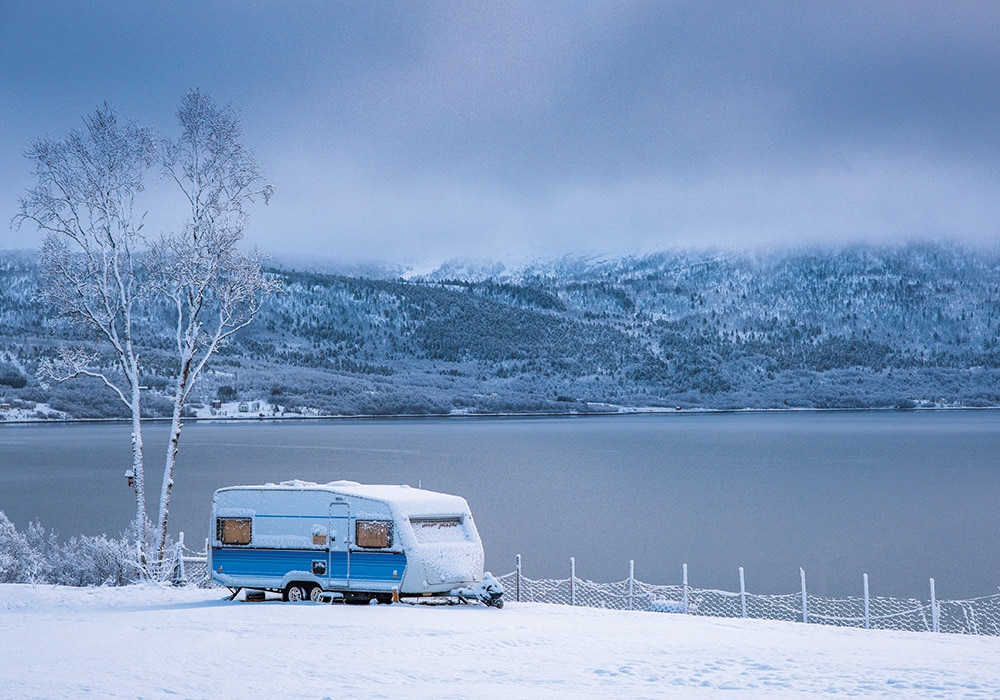Winter can be a hibernation time for many mobile home owners, while others love to continue exploring. MCD columnist Liz Dobson looks at what prep work needs to be done on your vehicles before heading out.
As seasoned motorhome or caravan owners, you’ll know that May is a great time to give your vehicle some much-needed TLC and maintenance prior to the season change after a great long summer. This includes both the exterior and interior of your caravan or motorhome. If you are planning on continuing your travels over autumn and winter, it’s vital to ensure you have the correct equipment for colder, and wetter climates, especially as you’ll probably be spending more time inside.
Parked up
If you’re planning to store your caravan or motorhome over winter, take precautions so it survives winter without you inheriting costly repairs. The most important aspect is to drain the caravan’s water system. When water freezes it expands. This expansion usually causes water pipes to rupture and causes serious damage to the plumbing components. Anything that holds water should be drained; that includes your toilets, waste water tanks, kettles…if it holds water, empty it.
Drain the system by opening all the taps and removing the drain plug, as this will allow gravity to do the work for you. While there are ways to drain the system via pressure and/or blowing through the system, seek guidance before doing this yourself, as they can damage plumbing components or blow out seals.
While your mobile home can stay happily immobile for a long time, closed doors and windows can create mould and stale air inside the vehicle. Wipe down surfaces and cupboards with an anti-bacterial cleaner to prevent damp or mould spores forming, and keep cupboards, wardrobes, fridges etc open to allow air to circulate.
You can also use a dehumidifier on a low setting inside your RV to keep it fresh. Make sure you empty it – or at least check it – every few days or even once a week. You can generally leave all your soft furnishings and upholstery in the caravan if you have a dehumidifier running through the winter. If you don’t have a dehumidifier, remove the largest items of upholstery and store them inside your home, if you have the space.
Whether you are on or off the road, it’s a good idea to place moisture-absorbent products in the wardrobe. They are available at most supermarkets and easily last for a couple of months.
Alongside the issue of dampness for vehicles stored over winter is the problem of mice, so have a few traps on your motorhome or caravan floor and check them once a week.
Storage costs
While many motorhome and caravan owners have the luxury of a parking space for their vehicles on their property, others depend on off-site storage. Try to find a local dedicated business that stores caravans and motorhomes; otherwise companies such as Storage King quote $200 a month to keep your motorhome or caravan on a secure site.
Don’t be afraid to negotiate if you are planning long-term storage. Wherever you store your RV, try to avoid keeping it under trees. Bird droppings, falling leaves and even broken branches have the potential to seriously damage your vehicle. If you’re storing it somewhere other than your home, make sure you visit the site and examine the area before committing.

On the road
You hardy souls who love to travel in your motorhome or caravan during winter already know the importance of vehicle insulation. If you’ve never done a winter trip before, however, consider trialling a cold weather trip before you take to the frosty roads to avoid unhappy days and nights huddled under a thin duvet.
RV supplier Burnsco has some cheap ideas for insulation, such as buying a silver blanket that covers the inside of the windscreen and the driver and passenger door windows. Fit thermal curtains or blinds and make sure that all windows and doors close and seal properly to prevent draughts. If you have LPG gas for cooking and heating in your caravan, consider carrying a spare bottle.
Off-grid caravan owner and blogger Karen Nisbet, aka ‘TravellingK’, recalls running out of gas while being stuck in a Coromandel campsite after it rained for three straight days. That meant she couldn’t cook, heat water or use the heater. She swapped the bottle but has since considered buying a generator in case of such emergencies, although she is wary of noise. She also found that her single solar panel and small battery wasn’t suitable in poor conditions to charge her laptop and updated the system; winter travellers may want to consider upgrading.
If you’re planning on keeping cosy for long periods of time over winter, you might want to consider buying a diesel heater, as they can run from your vehicle’s tank, or from a fuel tank of their own. They are a larger upfront investment than LPG, however they are significantly cheaper to run, are quiet, and, usefully, can be used while you’re on the move.
If you’re heading to ski fields or in areas that you’ll experience snow, don’t forget you’ll need snow chains for your vehicle. They cost from $150 upwards each and you’ll need at least one pair; if you have a four-wheel-drive vehicle then two pairs are required. Practise correctly applying them to your tyres before you leave for cooler climates as you may have to attach them during bad weather. Keep some work gloves in the snow chains cover as you’ll need them when applying them in the cold.
Talking of clothing, have a good rethink of your wardrobe before you find yourself shivering under the duvet. Add thermal clothes and jackets to your wardrobe, and invest in decent boots and thick socks for the inclement weather. And talking of boots, consider buying a rubber mat to place as the door of your vehicle so you can place your muddy or damp footwear there.
Looking for motorhomes or caravans for sale in NZ? Browse our latest listings here.






